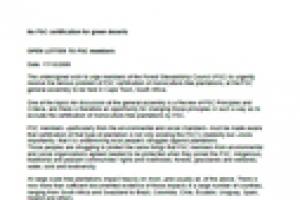As the neo-extractivist and development policies of the region’s governments continue to move forward, they come hand in hand with the destruction of the natural environment and the genocidal ethnocide of the indigenous peoples who inhabit it. The crossroads we are facing is more critical than ever: if the capitalist invasion is not stopped, the indigenous peoples and the rainforests will disappear.
Brazil
Bulletin articles
30 October 2010
Endless rows of tree trunks pass before our eyes behind the car window. In the utmost south of the Brazilian state Bahia, eucalyptus plantations are a common sight. Sometimes we can see the remains of the Mata Atlântica, the majestic Atlantic Rainforest that used to cover the region. Now there is only four percent left. Logging companies and sawmills have made huge profits here.
Bulletin articles
30 August 2010
Apesar da grande campanha ideológica das elites brasileiras em busca de apresentar o agronegócio como uma agricultura moderna, as contradições deste modelo de produção agrícola são difíceis de esconder.
Bulletin articles
30 August 2010
A comunidade quilombola de São Domingos, tradicionalmente instalada no norte do Espírito Santo, viveu um momento histórico nos dias 26 e 27 de junho. Nesta ocasião, formou-se um grande coletivo solidário a fim de trazer de volta a agrobiodiversidade à terra reconquistada, após anos de uso da área como monocultura de eucalipto de uma empresa privada transnacional.
Other information
20 August 2010
Norway is a major donor of the Amazon Fund, the Brazilian Development Bank’s fund that receives donations from governments, multilateral institutions, big NGOs and companies to fund forest conservation projects with the alleged aim of reducing emissions of greenhouse gases resulting from deforestation. The contribution of donors is recognised with diplomas that are nominal, non-transferable and do not imply equity rights or carbon credits to offset.
Bulletin articles
29 July 2010
We received a message from the Amazonas Sustainable Foundation (FAS) expressing that the article ‘Brazil: Juma REDD test case in the Amazon’, published on the WRM bulletin, presents various inaccuracies. However, FAS's “clarifications”, posed as a question and answer game, do not clarify much. On the contrary, they basically serve to strengthen what the WRM article said.
Other information
29 July 2010
Reaching the 32 Quilombola communities in the Sapê do Norte region of the state of Espírito Santo, located in the municipalities of São Mateus and Conceição da Barra, can be extremely challenging. On the vast plain that comprises this northern edge of the state, where the monotonous and homogenous landscape is comprised almost entirely of eucalyptus trees, there are very few landmarks to point the way.
Other information
3 July 2010
By José Heder Benatti.
This paper is a preliminary legal reflection on the role of common property in the Brazilian Amazon. It suggests the integration of two distinct normative scopes of the society, the legal right and consuetudinary law, with the objective to argue that the legal instruments of the Brazilian society can be used to protect the cultural and natural patrimony.
Bulletin articles
29 June 2010
At present, the initiative for Reducing Emissions from Deforestation and Forest Degradation (REDD) is rather a collection of proposals and some pilot schemes. However, it is being strongly pushed and at a remarkable speed inside as well as outside the United Nations process, with the aim of including carbon forest in the array of mechanisms for carbon permits and carbon offsets.
Other information
29 April 2010
On 19 and 20 March this year, peasant, indigenous and quilombola* communities and movements from the States of Espirito Santo and Bahia who are fighting to get back their territory invaded by monoculture eucalyptus plantation companies, paid a visit to Raiz and Vereda Funda in the locality of Rio Pardo in the north of Minas Gerais, in solidarity and to exchange experiences with these two communities struggling to regain their traditional territory.
Other information
29 April 2010
On 16 March 2010, Henrique de Souza Pereira, 24-years old, was killed by a team of guards of the private ‘security’ company hired by Fibria, former Aracruz Celulose and partner of Stora Enso in the Veracel Celulose company.
Other information
30 March 2010
The building of hydroelectric dams in Brazil has been marked by a lack of respect for the environment and society and more so by a lack of respect for the affected communities that see how their lives are radically changed and how they are annulled in the name of “capitalist society development.” In Brazil, over 2,000 dams have been built, resulting in the eviction of over 1 million people from their lands. There are federal government projects foreseeing the construction of 1,443 more dams over the next 20 years.


